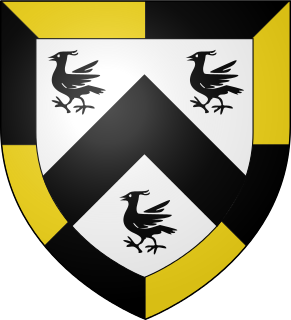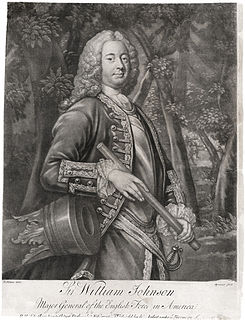The Bartlett Baronetcy, of Hardington-Mandeville in the County of Somerset, is a title in the Baronetage of the United Kingdom. It was created on 7 February 1913 for the civil engineer and contractor Herbert Bartlett. The presumed fifth baronet has not successfully proven his succession and is not on the Official Roll of the Baronetage, with the baronetcy considered dormant since 1998.
The Meysey-Thompson Baronetcy, of Kirby Hall in the County of York, was a title in the Baronetage of the United Kingdom. It was created on 26 March 1874 for Harry Meysey-Thompson, Liberal Member of Parliament for Whitby. He was succeeded by his son, the second Baronet. He was a Liberal, and later Liberal Unionist politician. On 26 December 1905 he was created Baron Knaresborough, of Kirby Hall in the County of York, in the Peerage of the United Kingdom. The barony became extinct on his death in 1929 while the baronetcy survived. The presumed fourth Baronet never successfully proved his succession and was never on the Official Roll of the Baronetage. When he died in 2002 the baronetcy became extinct as well.

The Strachey baronetcy, of Sutton Court in the County of Somerset, England, is a title in the Baronetage of the United Kingdom. This family was originally seated at Walden, Essex, where William Strachey was living under the rule of Edward VI. Later they moved to Surrey and at last settled at Sutton Court, Somerset. The title was created on 15 June 1801 for the politician and civil servant Henry Strachey. Sir Henry was private secretary to Lord Clive during his last expedition to India in 1764. He also took part in negotiations for peace with North America where he assisted the kings commissioners at Paris. He died in 1809 and was succeeded by his eldest son Henry, the second Baronet Strachey. His great-grandson, the fourth Baronet, was a Liberal politician. On 3 November 1911, he was created Baron Strachie, of Sutton Court in the County of Somerset, in the Peerage of the United Kingdom. He later served as Paymaster-General. The peerage became extinct on the death of his son, the second Baron, in 1973. The late Baron was succeeded in the baronetcy by his first cousin once removed, the sixth Baronet. He was the son of John Strachey, son and namesake of John Strachey, second son of the third Baronet. Strachey died January 2014 and did not use his title. Also, he had not successfully proven his succession and was therefore not on the Official Roll of the Baronetage, with the baronetcy considered dormant.

The Wigan Baronetcy, of Clare Lawn in Mortlake in the County of Surrey and Purland Chase in Ross in the County of Hereford, is a title in the Baronetage of the United Kingdom. It was created on 9 March 1898 for Frederick Wigan, a Director of the North London Railway. The presumed 6th Baronet, listed in Debrett's Peerage (2015) as the son of the 5th Baronet, has not successfully proven his succession and is consequently not on the Official Roll of the Baronetage.
There have been six baronetcies created for persons with the surname of Lawson, two in the Baronetage of England and four in the Baronetage of the United Kingdom. Two creations are extant as of 2010.

There have been eleven baronetcies created for persons with the surname Robinson, four in the Baronetage of England, one in the Baronetage of Great Britain and six in the Baronetage of the United Kingdom. As of 2008 two of the creations are extant while one is dormant.

There have been four baronetcies created for persons with the surname Hope, three in the Baronetage of Nova Scotia and one in the Baronetage of the United Kingdom. As of 2010 one creation is extant, one dormant and two extinct.
There have been two baronetcies created for persons with the surname Joseph, both in the Baronetage of the United Kingdom. One creation is extinct while one is extant.

The Edge Baronetcy, of Ribble Lodge in Lytham St Annes in the County Palatine of Lancaster, is a title in the Baronetage of the United Kingdom. It was created on 9 June 1937, for the Liberal politician Sir William Edge. He represented Bolton and Bosworth in the House of Commons.
There have been four baronetcies created for persons with the surname Thomson, one in the Baronetage of Nova Scotia and three in the Baronetage of the United Kingdom.
There have been four baronetcies created for persons with the surname FitzGerald, one in the Baronetage of Ireland and three in the Baronetage of the United Kingdom.

There have been seven baronetcies created for persons with the surname Russell, three in the Baronetage of England and four in the Baronetage of the United Kingdom.
There have been four baronetcies created for persons with the surname O'Brien, one in the Baronetage of Ireland and three in the Baronetage of the United Kingdom.

The Kellett Baronetcy, of Lota in Cork, is a title in the Baronetage of the United Kingdom. It was created on 6 August 1801 for Sir Richard Kellett, with remainder to the heirs male of his father Richard Kellett. On the death of the second Baronet in 1886 the title passed to the third Baronet, a descendant of Henry Kellett, younger brother of the first Baronet. However, he did not assume the title until 1906. The presumed fifth and sixth Baronets did not successfully prove their succession and were not on the Official Roll of the Baronetage. The presumed seventh Baronet has also not successfully proven his succession and is not on the Official Roll of the Baronetage, with the baronetcy considered dormant since 1966.
There have been three baronetcies created for persons with the surname Laurie, one in the Baronetage of Nova Scotia and two in the Baronetage of the United Kingdom. One creation is extant as of 2007.

There have been three Baronetcies created for persons with the surname Johnson, one in the Baronetage of Great Britain and two in the Baronetage of the United Kingdom. As of 2010 one creation is extant, one dormant and one extinct.
The Duntze Baronetcy, of Tiverton in the County of Devon, is a dormant title in the Baronetage of Great Britain. It was created on 8 November 1774 for John Duntze, an Exeter wool merchant and Member of Parliament for Tiverton. The family was of German descent. The presumed seventh Baronet never successfully established his claim to the title. Likewise, as of 13 June 2007 the presumed eighth and present Baronet has also not successfully proven his succession and is therefore not on the Official Roll of the Baronetage, with the baronetcy considered dormant since 1985.

The Wombwell Baronetcy, of Wombwell in the County of York, is a title in the Baronetage of Great Britain. It was created on 26 August 1778 for George Wombwell, Chairman of the Honourable East India Company and Member of Parliament for Huntingdon. The fourth Baronet fought in the Crimean War and took part in the Charge of the Light Brigade and in 1861 served as High Sheriff of Yorkshire. As of 13 June 2007 the presumed seventh and present Baronet had not successfully proven his succession to the title, and is therefore not on the Official Roll of the Baronetage, with the baronetcy considered dormant since 1977.
There have been two baronetcies created for persons with the surname Hawley, one in the Baronetage of England and one in the Baronetage of Great Britain.
There have been three baronetcies created for persons with the surname Maitland, two in the Baronetage of Nova Scotia and one in the Baronetage of the United Kingdom. Two of the creations are extant as of 2008 while the other is either dormant or extinct.










